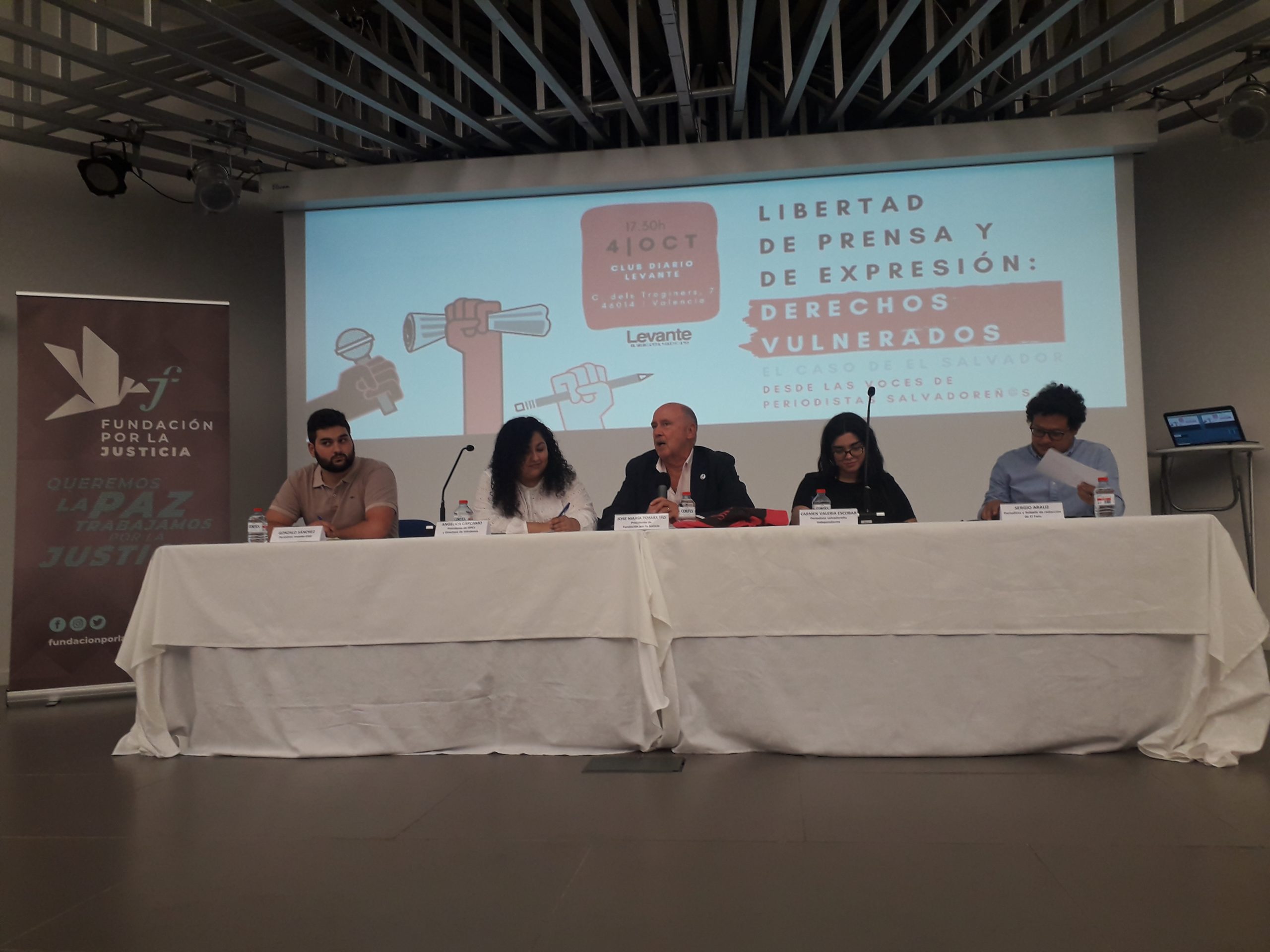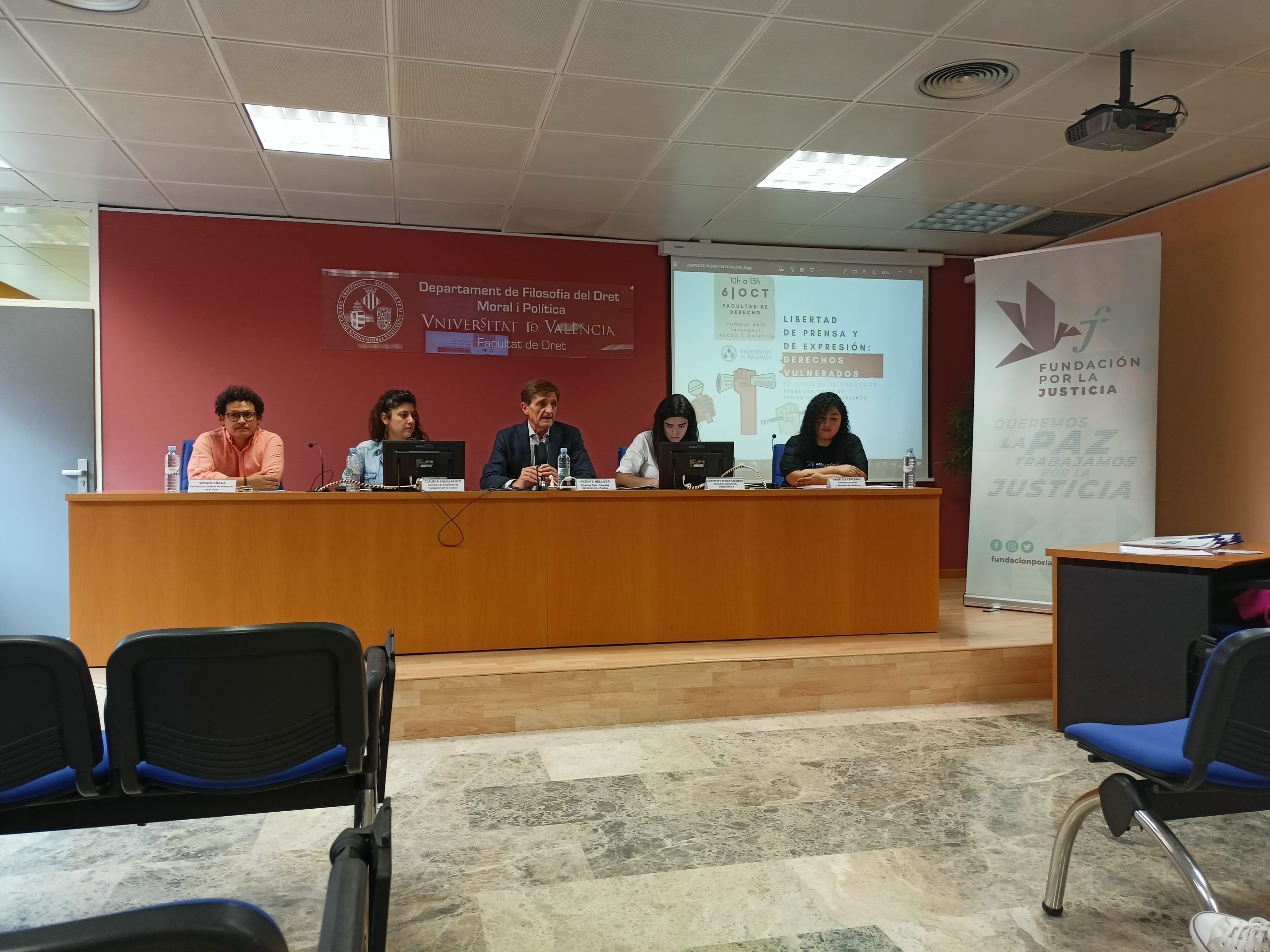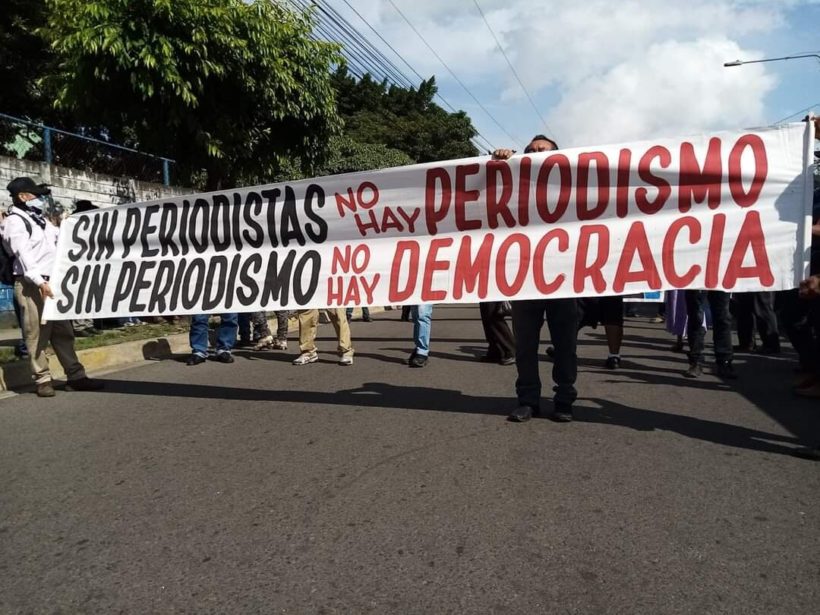Last October 4th and 6th, from the Foundation for Justice, we carry out an initiative to denounce the threats to freedom of expression and the press that occur in El Salvador from the voices of 3 Salvadoran journalists: Angelica Carcamo, president of the Association of Journalists of El Salvador (APES); Sergio Arauz, journalist and deputy editor-in-chief at The lighthouse; and Carmen Valeria Escobar, independent Salvadoran journalist who collaborates with different media outlets.

Colloquium on Freedom of Expression and the Press, Club Diario Levante.
In these days, which are part of our project “Visibility and defense of human rights activists linked to freedom of expression and press in The savedr”, the Salvadoran journalists conveyed the serious situation in which they find themselves. A first colloquium, which took place at the Diario Levante Club, was moderated by José María Tomás, president of the Foundation for Justice, and had the participation of Gonzalo Sánchez, editor of Levante-EMV. On October 6, an awareness and training day was held at the Faculty of Law of the University of Valencia, in collaboration with the Master of Human Rights, Peace and Sustainable Development. Inaugurated the day Vincent Bellver, director of the Department of Philosophy of Law and Politics. The round tables in which the 3 Salvadoran journalists took part were moderated by Claudia Squillacioti, project director of Foundation for Justice.

Conference on Freedom of Expression and the Press, Universitat de València.
The political framework in El Salvador is intricate. Topics like job insecurity waves attempted actions against freedom of the press and expression by government officials have become frequent, to such an extent that the numbers of threats, which occur through digital and physical means, have been increasing over the years.
Likewise, the invited speakers claimed the difficult access to information, accompanied by a blockade by the Bukele government, which has limited the exercise of the journalistic profession and the dissemination of “uncomfortable” news throughout the country, leading to cases of censorship and self-censorship. Without going any further, Angélica Cárcamo and Sergio Arauz focused on the new gag law approved by Salvadoran deputies, which punishes media users who report and transmit messages related to gangs and criminal organizations with up to 15 years in prison. A context that, in the words of Carmen Valera, is especially harsh on female journalists, victims of intimidation and direct insults, which lead to self-censorship and which differ from those received by men.
El Salvador has also experienced a phenomenon that was already thought to be distant: the forced migration of journalists, due to their persecution by State agents. Numerous cases of monitoring, surveillance and warnings have taken place in the Central American country. Hence, Angélica Cárcamo proposed the creation of a management of emergency funds for cases of preventive departures of journalists affected by the regime.
The dilemma here is the position adopted by the Salvadoran citizenry, which shows its little credibility and lack of interest towards investigative journalism and the real function of the media. One of the reasons is the attack by Bukele and his cabinet towards the press and critical voices, which have been labeled “bad”, being the target of stigmatization and persecution. Consequently, journalists from El Salvador propose a approach to people, preparing reports on the situation of press freedom and through comprehensive training processes, as well as the international awareness and openness of their situation, sharing experiences with other countries.

Demonstration against the Bukele Government, El Salvador, Pressenza News Agency, International Press Agency, September 2021.
We must not forget that the freedom of expression is a fundamental right that contributes to the formation of public opinion, guaranteeing political pluralism, considered a supreme constitutional value. Furthermore, freedom of the press, freedom of expression and free access to information are closely related, since they are based on the right to know and understand information.
The complicated access to information and the censorship produced in El Salvador make it impossible for the free formation of thought and the effective participation of individuals in the social, economic and political life in their country. What places this country in the ranked 112 out of 180 countries in it ranking world press freedom. This decrease in the classification is also due to the attacks and attacks suffered by journalists and defenders of human rights and fundamental freedoms, such as freedom of expression and the press: in 2018, 65 attacks and/or violations of this fundamental freedom were recorded. ; 77 in 2019; 125 in 2020; and 219 in 2021.
From Fundación por la Justicia we condemn and denounce the situation of violation of these rights and we want to join the advocacy and mobilization work aimed at demanding respect for freedom of expression and the press in El Salvador. To this end, we have presented a proposal for an Institutional Declaration to the various parliamentary groups of the Valencian Cortes to provide us with institutional support in the need to insist that the free formation of opinions, free access to a plurality of information, the free expression and dissemination of thoughts, opinions or ideas of all kinds constitute founding pillars of democracy and of the rule of law.
